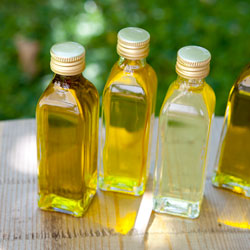 Keeping up to date with information is critical, especially in the world of health.
Keeping up to date with information is critical, especially in the world of health.
Products come in and out of fashion and I am committed to staying abreast of research. Over the last 6 months I have read more and more literature on flaxseed oil that concerns me, and I urge you to do your own research here. Flaxseed used to be an oil that I recommended, adding it to smoothies and cooked foods (not using it at high temperatures), however I now deeply question the shelf life of flaxseed oil and its potential to turn rancid. As a safety measure for your family please search and read about its potential effects on the thyroid gland and the impact of Isoflavones.
As you are most likely aware, the most damaging fats and oils for the body are man-made hydrogenated fats (trans-fats) and polyunsaturated fats and vegetable oils. Having undergone hydrogenation processes these fats and oils become a relentlessly toxic product which our bodies cannot process. They affect the entire body, damaging cell structure and unequivocally depressing the immune system.
With this blog I’d love to share with you my favourite cooking oils and other oils that I use on a daily basis in breakfasts and smoothies…
Cooking Oils:
- My ultimate favourite is Organic Coconut Oil
- My second favourite is Organic Olive Oil
Healthy Ways to Cook with Oils
Please refer to the Which Foods When Chart for age-appropriate time frames.
- Dressings: macadamia, safflower, olive and sesame oils.
- Baking: butter and coconut oil (non-deodorised).
- Frying: olive oil (lower temperatures), avocado and coconut oils (higher temperatures).
. . . . .
READ THE HEALTH BENEFITS RELATING TO THESE OILS…
Coconut Oil
My olive oil now sits in the pantry, reserved for occassional use while my enormous tub of cocnut oil sits on the bench and is used most days for some for of cooking. Coconut oil is a safe oil to use for cooking as it has a high burning point and its great taste make it a useful oil when sautéing and frying, or used with curries and Thai style dishes. You can also use it in dessert dishes and baking (greasing nuffin trays etc) or in your morning smoothies.
Coconut oil, being a healthy saturated fat that supports immune system function, has a great many health benefits. It is also easily digested and absorbed because it contains lauric acid (a proven antiviral, antibacterial, and anti-fungal agent), which may be great news for those who suffer from conditions such as Crohn’s disease, irritable bowel syndrome and coeliac disease. Research suggests that the anti-fungal nature of coconut oil helps to kill candida in the gut, whilst also helping the body eliminate toxins and assisting with the absorption of beneficial nutrients from our food. Thus aiding the body at a cellular level and in-turn, supporting the immune system.(1) I loving healing foods!!!
Interestingly, coconut oil is reported to enhance metabolism by stimulating the thyroid gland, which may aid weight loss and could be helpful in treating Hypothyroidism, an underactive thyroid.
The best coconut oil to buy is one that is ORGANIC, cold or expeller-pressed and unrefined.
Olive Oil
Thanks to its status as a spotlight food in the Mediterranean Diet, and thanks to extensive research on its unique phytonutrient composition, olive oil has become a legendary culinary oil with very difficult-to-match health benefits.
- Olive oil is a complex compound made up of fatty acids, vitamins, microscopic bits of Olive and other oil-soluble components. Olive oil has long been recognized for its unusual fat content. This plant oil is one of the few widely used culinary oils that contains about 75% of its fat in the form of oleic acid (a monounsaturated, omega-9 fatty acid). Olive Oil is the second best natural source of Vitamin K available. The greener the vegetable or oil the higher the content because Vitamin K is associated with chlorophyll.
- Research has also firmly established the risk-reducing effects of olive oil intake with respect to cancers of the breast, respiratory tract, upper digestive tract and, to a lesser extent, lower digestive tract (colorectal cancers).(2)
- The monounsaturated fat content of olive oil has also been linked not only to cholesterol reduction, but also to reduction of blood pressure.(3)
- The anti-inflammatory strength of olive oil rests on its polyphenols, which have been shown to function both as antioxidants and also as anti-inflammatory nutrients in the body. The very number and variety of polyphenols in olive oil helps explain the unique health benefits of this culinary oil.
What to look for when purchasing Olive Oil
Since olive oil can become rancid from exposure to light and heat, there are some important purchasing criteria you should follow to ensure buying a better quality product. Look for olive oils that are sold in dark tinted bottles since the packaging will help protect the oil from oxidation caused by exposure to light. In addition, make sure the oil is displayed in a cool area, away from any direct or indirect contact with heat.
Olive oil is also available in a variety of grades, which reflect the degree to which it has been processed.
- “Extra virgin olive oil” is derived from the first pressing of the olives and has the most delicate flavor and strongest overall health benefits.
- “Virgin olive oil” is also derived from the first pressing of the olives but has a higher acidity level than extra virgin olive oil (as well as lower phytonutrient levels and a less delicate taste).
- “Pure olive oil” is a phrase that is somewhat confusing, and perhaps also somewhat misleading, it typically means that the oil is a blend of refined and unrefined virgin olive oils.
- “Refined olive oil” is obtained from unrefined virgin olive oils; refined olive oil loses some of its unique nutrient content through the refining process.
It is generally recommended that you purchase ORGANIC extra virgin olive oil over all other olive oil types, including “pure olive oil”.
How should you store Olive Oil?
Light and heat are its enemies. Olive Oil should always be stored in a refrigerator. Protect your olive oil’s flavor and antioxidants by transferring 7 to 10 days’ worth of oil to a smaller bottle to lessen the oxidation that occurs when the oil is exposed to air. Leave this small bottle at room temperature for easy use, but refrigerate the rest. When chilled, olive oil will solidify slightly and turn cloudy, but once restored to room temperature, it will regain its normal appearance, and its quality will be better maintained. Although it may be convenient, definitely don’t store your olive oil near the stove as the heat will damage it.
Everyday oils for adding to breakfasts and smoothies that I give my children would also include;
- Innate Choice — Premier EPA/DHA Omega 3 Fish Oil
- Omega Sufficiency Mercury-free Wild Anchovy, Herring and Sardine Oil — great fresh citrus taste — breakfast isn’t the same with out it!
- Chia Oil — If you haven’t heard of it then I encourage you to grab some.
Fish oil
Fish oil has been extensively studied for its´ role in human health because it contains high levels of Omega 3 fatty acids (especially eicosapentaenoic acid (EPA), and docosahexaenoic acid (DHA), which we can only derive from our diet. These essential fatty acids play a critical role in reducing inflammation in the body and are shown to provide remarkable health benefits such as improvements in cardiovascular, brain and eye development and function, reduced depression and anxiety, and even breast cancer prevention 1. Over 2000 studies highlight the vast range of problems that are associated with a deficiency of omega-3 2. Researchers last year found that around 50% Australian children are not consuming enough omega-3 for optimal health 3. In general, the typical Western diet is 10-20 times too low in omega-3 to adequately balance our high levels of omega-6 from grain intake 2.
Because of contamination issues, taking a supplement is quite possibly better than fresh fish for supporting your omega-3 needs. Fresh fish, especially the larger and longer-living varieties such as tuna, shark, swordfish and tilefish, can accumulate toxins such as mercury (which can damage the nervous system) and dioxins and polychlorinated biphenyls or PCBs (which may be carcinogenic with chronic low-level exposure) 4. Additionally, the feed given to commercially farmed fish (e.g. salmon) has been shown to be contaminated with substantial quantities of PCBs, organochlorine pesticides, brominated diphenyl ethers, PAHs and mercury 4. Stringent recommendations in one study of salmon in Europe found it was so contaminated that it should not be consumed more than once every 5 months to prevent an elevated risk of cancer 6.
Fish oil in supplements has been shown to contain relatively low levels of contamination 1. This may be due to the species of fish used – those that are lower on the food chain and less thus likely to accumulate contaminants, and also to distillation processes. In addition to this, mercury is found in fish meat and not fish oil, however liver oils may have higher levels of contaminants as they are generally made from oils using the whole fish 1.
One marine oil you could consider is Krill oil made from the small, highly replenishing krill crustacean. Because krill are at the bottom of the food chain, they are far less able to accumulate toxins. They also contain a natural antioxidant, astaxanthin, shown to prevent rancidity and any fishy reflux, and better absorption, bioavailability and environmental sustainability than fish oil 7.
What is Chia Oil?
The Omega-3 Chia is an ancient crop from the Aztecs that was cultivated in the tropical valleys of Mexico and South America. Chia is an oil seed, different from comparable oil plants in its fat content: two-thirds of Chia oil are Omega-3 essential fatty acids (polyunsaturated) while only 10% are saturated fatty acids. Because Omega-3 sources are becoming increasingly scarce in the world, Chia is now attracting great attention.
In addition to its extremely high Omega-3 content, Chia has other components that make it attractive for human nutrition: antioxidants, fiber, vitamins B1, B2, B3, plus minerals such as phosphorus, calcium, potassium, iron, zinc and copper.The essential oil pressed from chia seeds contains important nutrients, as well as omega-3 fatty acids. It provides both calcium and the chemical boron, which helps the body absorb calcium. Composed of unsaturated fat, it also helps the body to absorb vitamins A, D, E, and K.(d) People who have trouble with wheat and gluten products might also appreciate the fact that chia oil is a gluten-free supplement.
. . . . .
Warmly,
Jennifer
Bach. Chiropractic, Bach. App Clinical Science
Registered internationally, no longer practicing as a chiropractor in Australia.
. . . . .
- Consumerlab.com Fish Oil and Omega-3 Fatty Acid Supplements (EPA and DHA from Fish, Algae, and Krill) Product Report
- Chestnut J. The Innate Diet & Natural Hygiene. Canada: Chestnut Wellness and Chiropractic Corporation; 2004.
- Meyer BJ, Kolanu N. Australian children are not consuming enough long-chain omega-3 polyunsaturated fatty acids for optimal health. Nutrition 2011;27:1136–1140
- Costa LG. Contaminants In Fish: Risk-Benefit Considerations. Arh Hig Rada Toksikol 2007;58:367-374
- Domingo JL. Omega-3 fatty acids and the benefits of fish consumption: Is all that glitters gold? Environment International 2007;33: 993–998
- Easton MD, Luszniak D, Von der Geest E. Preliminary examination of contaminant loadings in farmed salmon, wild salmon and commercial salmon feed. Chemosphere 2002;46:1053–1074
- Ierna M, Kerr A, Scales H, Berge K, Griinari M. Supplementation of a diet with krill oil protects against experimental rheumatoid arthritis. BMC Musculoskeletal Disorders 2010; 11:136
(b-c) https://whfoods.org/genpage.php?tname=foodspice&dbid=132
(d) https://www.wisegeek.com/what-is-chia-oil.htm
[/expand]


 Keeping up to date with information is critical, especially in the world of health.
Keeping up to date with information is critical, especially in the world of health.
